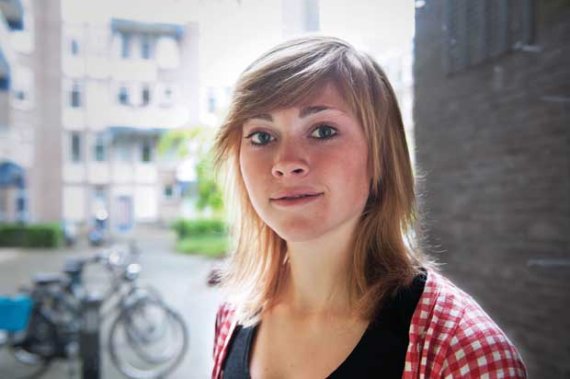Milou has been living and studying in Wageningen since last September. She had long looked forward to this ‘fresh start’. And everything is going very well for her now. She is enjoying her studies, she is an active member of the board of IBEX climbing club and she enjoys cycling and running in the Wageningen area. Her eating disorder has faded into the background, more than ever before. Yet is it not easy to put the label ‘anorexic’ behind you for ever, especially if you are as open about your experiences as Milou.
To what extent have you been able to start again with a clean slate?
‘I really planned to tell no one about my writing and what I had been through, but that was rather naïve. People Google you anyway, or they hear things on the grapevine and then the story soon gets around. Everyone on my course and at my climbing club knows about it by now, without my having told them.’
Is there no getting away from it?
‘No.’
And here you are now, being interviewed. Do you mind?
‘No I don’t, actually. Perhaps I still like being interviewed. For a while I even needed interviews so as to talk about my eating disorder, because I found that so hard to do. That plays less of a role now.’
You made your debut at the age of 15 with My Dearest Enemy, in which you describe how you got anorexia as a young girl. What makes a teenager write a book like that?
‘After all I had been through, I already wrote a lot in diaries. My father suggested I write a book. That turned out to be something else again and when I was writing I didn’t go through my diaries anymore. I couldn’t just pour out all my troubles – there is more to a book than that. It needs a plot, scenarios and not just unconnected events with a load of emotion. It turned out to be very good to get it all out of my system by writing, and it was enjoyable as well. Once I got started I didn’t stop.’
You describe your hospital admission in detail in your books – it makes a moving and personal story. Did you never think: anyone in the world can read this, should I write it down?
‘I often get that question, but I never dwell on that issue. I don’t have to be ashamed of what happened. It happened to me, due to some higher powers or something. At the time I couldn’t do much about it. Many people who go through this don’t dare write it down, but I want to help others and that makes it easier to share your experiences.’
Help? Is writing a bit of a mission too, then?
‘Yes, I really want to inspire people and make them think. In Lost I take that mission quite far. I want suicide to be openly discussed, you see. There are lots of people walking around in Holland with the idea of suicide on their minds, and people who have lost someone to suicide. Suicide happens a lot but it is surrounded by a taboo.’
Do you want to support people who are still suffering from anorexia now, too?
‘Yes, I still get mail in response to my first book. People write that they relate to it and take comfort from it. I like reading their responses – it adds an extra dimension to the writing. Answering them takes a lot of time, but I think it’s very important. Sometimes it’s quite taxing: there are people who pour out their life story. I’m doing very well now but for a long time I kept getting dragged back down again. It was difficult because I didn’t want to get stuck, but that world kept pulling at me.’
How is your ‘dearest enemy’ doing now?
‘I still struggle with it, but so little that I can just be myself in Wageningen. It is something that has such deep roots, has become so much a part of my system, my feelings and memories, that you can’t let go of it or get over just like that.’
There are no books in the pipeline now but will you ever write again?
‘I certainly hope to write another book some time. But at the moment I mainly just write lots of emails for the board, and for the newsletter of the climbing club. I don’t ever want to write for a living, because I am afraid that would spoil the fun of it. The fact that you are not writing as a form of relaxation but because you need the money.’

